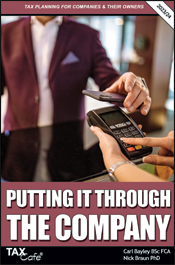Business Tax Rates:
Commercial Property
How to Reduce Your Business Tax Rates
IF YOU occupy commercial property, you have to pay business rates. For some reason this tax is much, much higher than the council tax payable on an identical property.
Property Tax and Business Tax Planning
For example, I know a small business owner who converted a residential house into an office. The business rates came to almost double the council tax on the same property. To add insult to injury, he also has to pay to get his bins collected!
Some would argue that higher taxes for business owners are justified because they obtain more services from local authorities. This is questionable, however, and the simple truth may be that businesses are easier to tax than private individuals.
Many businesses are now struggling under these heavy tax bills. In a recent survey more than half of all councils reported that companies are having difficulty paying their rates.
So what can you do to reduce your business rates? Let’s take a brief look at how they are calculated and then some of the main tax planning techniques.
How Business Rates Are Calculated
Every commercial property is given a “rateable value” by the Valuation Office Agency (VOA), based on its open market rental value. Rateable values are reviewed every five years and new ones come into force in April next year.
A multiplier is then applied to your rateable value. In England and Scotland it’s generally 0.485 and in Wales 0.489. Northern Ireland has a non-domestic regional rate (0.2989) and district rates.
So if a property in England has a rateable value of £10,000, the tax charge would be £4,850, ignoring any special discount that may be allowed.
Working from Home
Did you know that if you work from home you could be liable to pay business rates instead of council tax on the part of your house that you work in?
In practice very few home businesses come under the spotlight and you would generally only be liable to pay business rates if you use part of the house exclusively for business purposes (using part of your home exclusively for business purposes is rarely advisable because it also harms your main residence exemption for capital gains tax purposes).
Small Business Relief
Properties with low rateable values attract special reliefs. The amount of relief varies significantly between England, Scotland, Wales and Northern Island.
For example, in England and Scotland you are entitled to small business rate relief if the rateable value of your premises is less than £15,000 (£21,500 in London). This could see your rates bill reduced by up to 50% and possibly even 100% in Scotland.
However, in many cases, small business rate relief is not automatic – you have to claim it. Many businesses neglect to do this, wasting thousand of pounds every year.
If you think you may qualify, get hold of your most recent demand notice and see if it includes any special deductions. Alternatively contact the rates team at your local authority.
Spreading the Pain
Businesses can spread the latest 5% rates increase over three years. Those that have seen their rates go up due to the ending of the transitional relief scheme can also spread the increase in their payments over three years. Local authorities are writing to businesses providing the option to revise their 2009/10 payments. In the meantime, businesses should continue to pay their bills as normal.
Empty Property
Empty properties with a rateable value of less than £15,000 qualify for a temporary one-year exemption for 2009/10. Other empty properties in England are exempt from business rates for the first three months (six months for industrial property). After that the full amount is payable. Slightly different rules may apply elsewhere.
There is an interesting loophole that sometimes allows those sitting on empty commercial properties to arrange occupation either by themselves or someone else for just six weeks and reset the zero rates period for another three or six months. Specialist firms will even install tenants for you!
Hardship Relief
If your business is struggling to pay its business rates you can apply for hardship relief which, in certain circumstances, can result in a temporary exemption. Local authorities have a fair amount of discretion to help you and many are aware that businesses are suffering and are willing to help.
Reducing Your Rateable Value
Another way to reduce your business rates is to appeal your rateable value. Your rateable value could be wrong for any number of reasons, including errors measuring the size of the property.
There are plenty of firms that will help you make an appeal. Some are reputable, others are highly unethical. It is generally best to use a firm belonging to either the Royal Institution of Chartered Surveyors (RICS) or the Institute of Revenues Rating and Valuation (IRRV).
A reputable advisor will help you on a no-win, no-fee basis, usually charging a percentage of the money saved.
Some would argue that you should always appeal against your rateable value, even if there is only a slim chance of success. However, a good advisor should also check to ensure that your current rateable value is not too low because, in the worst case scenario, it could be increased!
Watch out for firms that charge fees irrespective of outcome. Some charge a fee once your appeal is “accepted”, an administrative term which means your case will be looked into but which has no bearing on whether your claim will be successful.
Many thanks to David Webb from Paddisons Chartered Surveyors, who provided much of the technical content for this article.




